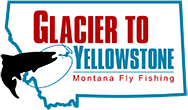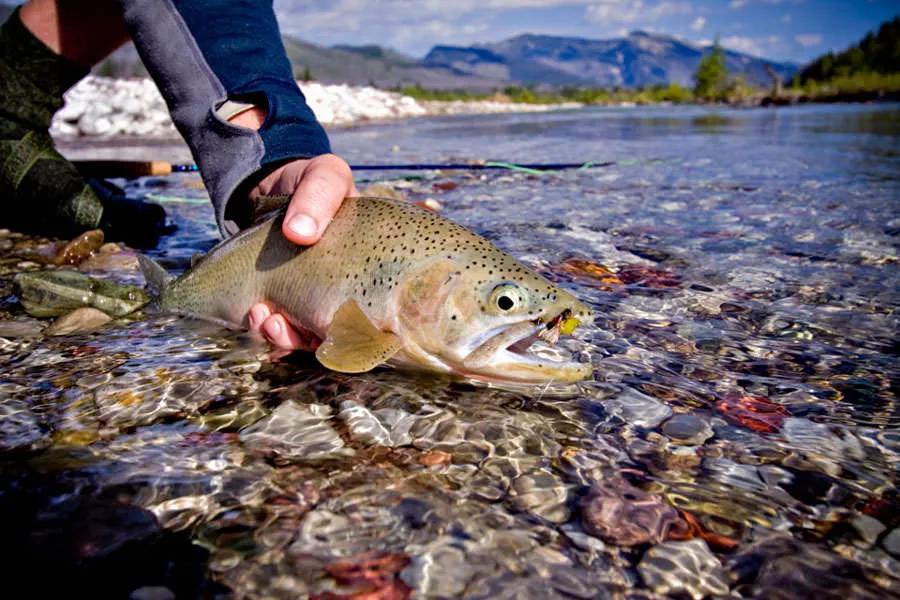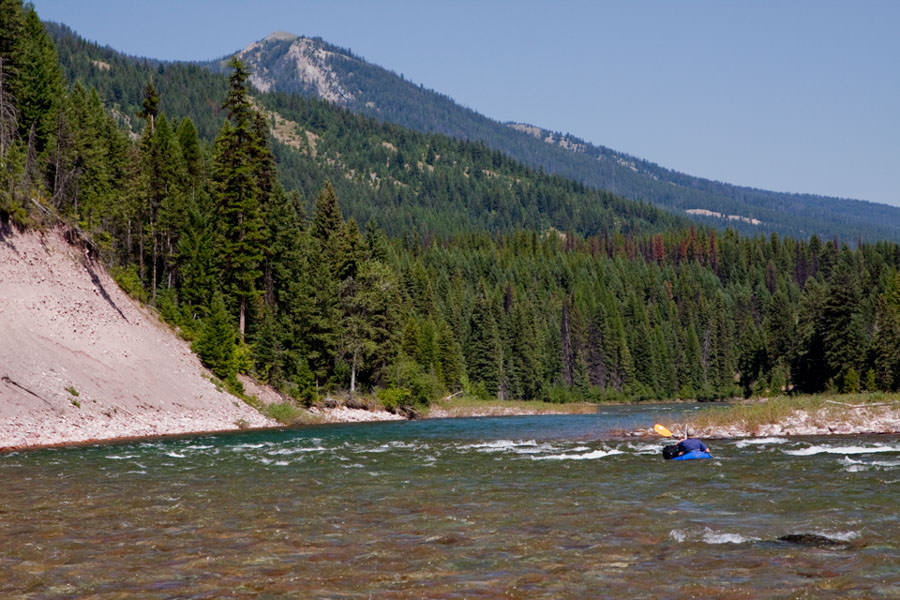Long before I had a bucket list and two pack donkeys, I yearned to hike up the South Fork of the Flathead River. Years of guiding in western Montana during the summers provided me with great exposure to Montana's fabled waters, but the idea of fishing for pure strain Westslope cutthroats in the heart of the Bob Marshall Complex nagged at me right into retirement.
In 2008 my sons Darin and Brandon joined me for a quick excursion up the South Fork from the Meadow Creek Trailhead to an area below Damnation Creek. The scenery is spectacular from the towering mountains to the crystal clear river that courses 52 miles from Danahar Creek to where it empties into Hungry Horse Reservoir. It took us two days to reach an alluring spot along the river. We fished that night and the following day before packing up and heading down the trail for another two days of hiking. The fishing fulfilled my expectations and whet my appetite for an extended trip. That night, after I had pooped out after a full day of great fishing, my two sons regaled me with stories around the campfire about fishing into the evening and never catching a trout under twelve inches.
In 2009 my son Brandon joined me for an extended trip up the river for a full week of exploring and fishing. Joining us was my dog, Buddy, and my two pack donkeys, Harley and Lately. Set aside as a wilderness in honor of the famed forester Robert Marshall, the Bob Marshall Wilderness encompasses almost 4.5 million acres and over 3,000 miles of trail. Located south of Glacier National Park, many visitors hike or pack into the wilderness from numerous trailheads. Almost all visitors leaving the Meadow Creek Trailhead have a fly rod tucked into their pack or strapped to the back of a horse, donkey or mule. The trail rises far above the raging gorge water and opportunities to bushwhack off the trail to the water are few and far between.
FISHING
The first night's campsites are located on Bear Creek and the meadow section just around the corner from Bear Creek. From the trailhead to Bear Creek is approximately 10 miles. In 2008 my sons and I fished this section with disappointing results. This section gets hit hard, and I had been told that I would have to get up into the Black Bear Guard Station area to begin catching fat fish. In July of 2009 my son and I were tired, and we never wet a line at Black Bear Creek. On the second day of hiking in both years, we camped in the Little Salmon Park area and discovered excellent fishing for 12 to 16-inch cutthroats.
Although cutthroats can reach 20 inches in the South Fork, my largest measured fish for both years was 17.5 inches. Whitefish may also be caught, and the illusive bull trout, if caught, can provide memories for years to come. The most satisfying fishing experience is the opportunity to catch 14 to 16-inch trout on the surface with standard attractor patterns. When I went down and dirty, I caught a number of fat bodied fish out in the fast riffle water that we generally associate with rainbows. However, I caught my largest scarlet male in 10 inches of water in a shallow side channel above Independence Park.
Our goal was to camp and fish on the White River, a distance of 25 miles from the trailhead. When we got there, I was really disappointed. The last two or three miles of the meandering White River break up into shallow braided channels that hold only smaller fish. I just didn't have the energy to hike up the White River for 9 to 12-inch fish when I could camp and fish on the South Fork above and below the confluence with the White River. In fact, my son and I had good fishing in this area, although our wilderness experience was tempered somewhat with up to 50 floaters who congregated at the White River looking for campsites on their first day float. I suspect that in the near future, floaters will be restricted with limitations and drawings similar to the Smith River. Maybe it is sour grapes on my part that I cannot afford to hire outfitters to truck in my raft and equipment, but I was really shocked by the river traffic.
My son and I fished above the White River one evening in a very promising looking pool. Earlier in the day we had retreated when three rafts dropped off at least 15 anglers above us and below us. On our return that evening, we talked to a camper who had packed into the area with three mammoth donkeys. On our approach to skirt his camp, he came out and told me that an angler had just fished the immediate area, including the pool we were headed for just above his camp. When we reached the pool, we had it to ourselves. After each of us landed a couple of fish and my son growled about breaking off a big one, Brandon turned to me and asked if I had ever landed a fish that had an embedded fly stuck in its jaw from a previous angler. I told him that it had happened a couple of times in my life, the most memorable being an 18-inch brown that I landed in Wyoming with a huge Muddler still hanging below its jaw. Ten minutes later Brandon landed a big fish. Surprise! The fish had his broken off fly, it had a new Elk Hair Caddis, obviously from the angler who had fished the hole only an hour before our arrival, and it had the third fly, a new Royal Wulff that Brandon had just tied on. We had to conclude that that cutthroat was either extremely dumb or extremely hungry!
HIKING
Our shortest hike was probably about 6 miles, while our longest hike was saved for the last day when we hiked 15 miles to our truck and horse trailer at Meadow Creek Trail. At 28 Brandon is young and strong. At 65 I am both weak and vulnerable to foot blisters and pulled muscles, the latter of which was mostly avoided when Brandon urged me to do stretching exercises after long breaks. In the summer of 2008, we met many more hikers than we did in 2009. Many of the hikers were exhausted from packing too much weight. I remember in particular meeting four or five middle-aged hikers heading back to their vehicles. They had gone in when the water was high and the fishing slow. When we paused on the trail to converse with them, they could barely engage in more than a sentence. A few were literally too exhausted to stop and talk and stumbled on past us. Leading my pack donkeys with just a fanny pack around my waist, I knew that a pack on my back would do me in. The weather can be very fickle in the Bob Marshall changing dramatically in a short time period. In 2008 we suffered from high temperatures. Although the trail is considered moderate in elevation gain, long open exposures of burned out timber made for an exhausting day of hiking. In 2009 we had mild temperatures and each day we commented how much easier the hike had been compared to the previous year. I shudder when I think that Bob Marshall would take 35-mile hikes for his health and is reputed to have hiked 70 miles in one 24-hour period!
While camping near the White River, Brandon and I met two intrepid adventurers that covered the best of both worlds--hiking and floating. These two modern day explorers motto was "Less is better, but left behind is bad." On their first day into the wilderness their packs weighed 45 pounds. This included a 5 lb. Alpacka Raft (alpackaraft.com). The one fellow, who was eager to share with us his preparations for the trip, fired off the exact weight in pounds and ounces each time we asked him how much his tent or sleeping bag weighed. When I asked him if he purchased the commercial, freeze-dried trail meals, he said that he preferred bringing his own rice and noodles, along with spices and tea. He assured me that he never went hungry, although he did say he added protein with a few trout dinners. You can see these two men float past our campsite in the accompanying YouTube video. I am intrigued with the possibilities. Now, if I could just find someone to hike in with my two donkeys and drop me off.
I found that if I stayed a full day at a campsite before pushing up the trail, I recovered fully and had time to tender my feet. The absence of photographs of our campsites is due in part to the fact that I usually had items scattered around the panniers, but we left no trace of our presence and no photographic reminder of our disorganized campsites. On future trips I will have kit bags for similar items, such as cooking gear. This year the donkeys turned four so they could each pack 125 pounds. I brought everything but the kitchen sink. This included a leaky tent that needs to be replaced, a full-size air mattress, lots of donkey gear to secure them at night and lavish meals right out of a can. We had bacon and eggs and English muffins a few mornings and a steak and potato dinner the first night. We would have had hot dogs, but Brandon pre-cooked them one morning and set them aside to cool. They never had a chance to cool--Buddy ate the whole pack. While we were on the trail, we kept our lunches simple. We packed tuna fish in foil packets along with crackers, packets of mayonnaise and string cheese and trail mix. Often I would not have an appetite on the trail, and I would subsist on an apple, a small can of fruit cocktail, a handful of nuts and a few crackers with tuna. After a lifetime of catch-and-release, I could not bring myself to kill a fish so Brandon corrupted me with a juicy 12-inch trout wrapped in foil and baked in the coals. It was delicious despite my scruples.
PREPARATION
If you plan a trip, be sure to go prepared with rain gear and warm clothes at night. If you are going to buy a new tent, don't do what my son Brandon did. While shopping at Walmart for a new tent, the SALE sign caught his eye. Twenty bucks! Not bad he thought. In fact he joined me at the check out line bragging about his shopping triumph. Light weight and compact, the tent crushed his buying acumen when he discovered at the first campsite that the tent was a junior miss tent for one child under the age of 12. For a week he slept in a fetal position. If you are middle-aged or older, be sure to bring all your medications, including pain pills in case you suffer an injury. I kept a lot of band-aids and moleskin in my fanny pack along with a pocket knife, mosquito repellant, a bandana, map, an apple, some hard candy and a head-lamp. One night it rained hard and my extra change of clothes got soaked in my leaky tent. My other set of clothes were hanging outside completely wet from wading the previous evening. Fortunately, the next day was bright and sunny, but I learned a lesson to protect my clothes from rain and moisture. One thing that I know that I had that the back-packers didn't have was a bottle of whiskey and a bottle of Irish Cream. Here's looking at you Harley and Lately. Boys, next time I will bring more carrots.
Brandon, David and Darin Archer, 2008
Top off your gas tank if you are heading up the South Fork. Follow Highway 2 to the town of Hungry Horse at mileage marker 143.4. Follow the signs to Hungry Horse Dam. Cross the dam and follow the West Side South Fork Road. The mileage markers start at the dam. Spotted Bear Campground, a few miles above the inlet to Hungry Horse Lake, is 55 miles from the dam, and most of it is dirt road. If you are pulling a trailer, plan on cruising at 35 mph. Draining the Bob Marshall Wilderness, the South Fork is the crown jewel of northwestern Montana. From the Spotted Bear Campground, access is by trail or plane into the designated Wild River section. A good portion of this wilderness encompasses the Jewell Basin Hiking Area. To reach the trailheads to the Jewell Basin, look for Wounded Buck Road, West Fork Clayton Creek Road, Clayton Creek Road, Graves Creek Road or Wheeler Creek Road.
Unlike the other forks of the Flathead River, the South Fork fishery is not a migratory fishery owing to the completion of Hungry Horse Dam in 1952. Expect to catch cutthroats averaging 8 to 10 inches. Bull trout, although plentiful, have been protected since 1993. One of the guides that I spoke to said that some days the river offers many 14- to 16-inch trout, but again, access is limited. The primary floating section that can be reached by road is from Cedar Flats River Access to a launch access just below Spotted Bear Campground. The guides in this country work very hard for their wages. Having guided in western Montana all those years, the toughest launch I can think of consisted of dragging my raft maybe 30 yards to the water. When I got out of my truck at Cedar Flats, I kept thinking, there must be a mistake! I walked a narrow trail about 50 yards until the trail plunged down a cliff. Standing high up on the ridge, I couldn't even hear the water below. Later I talked to a local guide who told me he has to completely break his raft down, and depending on the willingness of his clients, he could count on a minimum of four trips up and down the steep trail.
From Cedar Flats to the Spotted Bear Access point is eight miles and rated Class II water. Above Cedar Flats is a gorge rated Class V to VI. From Spotted Bear Campground Boat Launch to the next access, Twin Creeks, is 6.5 miles and rated Class III, although I swear there are some Class IV spots, which is probably just a perspective view sitting in my 10-foot, one-man drift boat.
Numerous non-fee primitive campsites may be found during the last few miles along Hungry Horse Lake. In addition to the Spotted Bear Campground, Crossover Campground can be easily found on the east side of the lake a couple of miles below Twin Creeks. When you are headed to the Spotted Bear Ranger Station, you will cross the river on the South Fork Bridge and come to a T-intersection. If you turn left, the road heads back down the lake on the eastside to the town of Hungry Horse. Crossover Campground is a few miles down this road and provides a boat launch to the lake.
River description by David Archer








